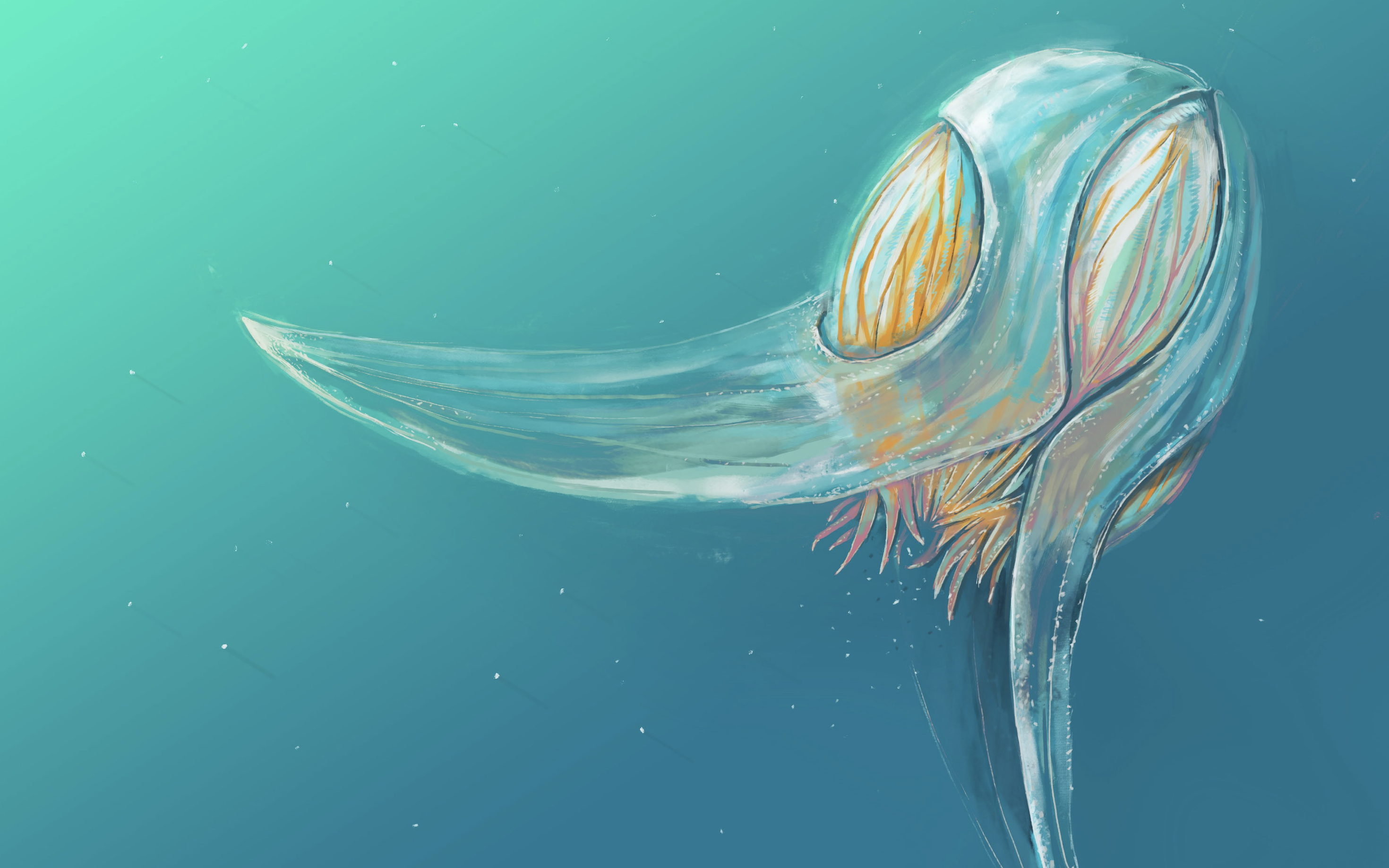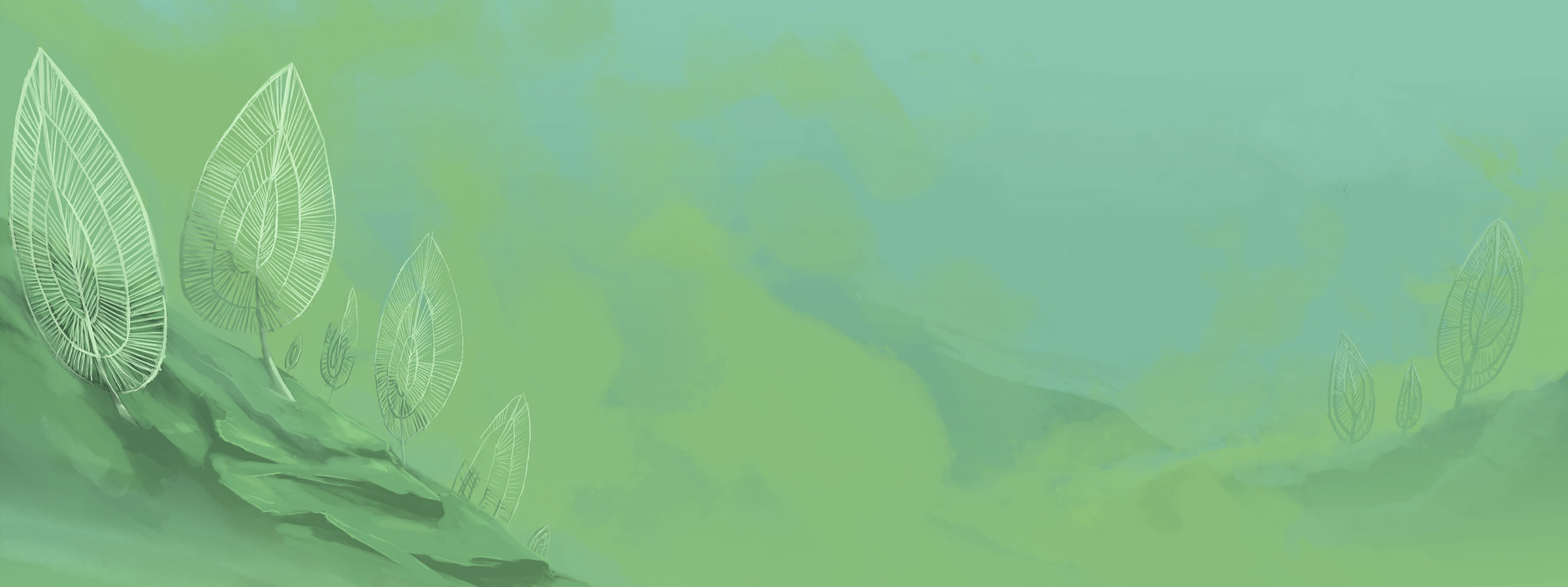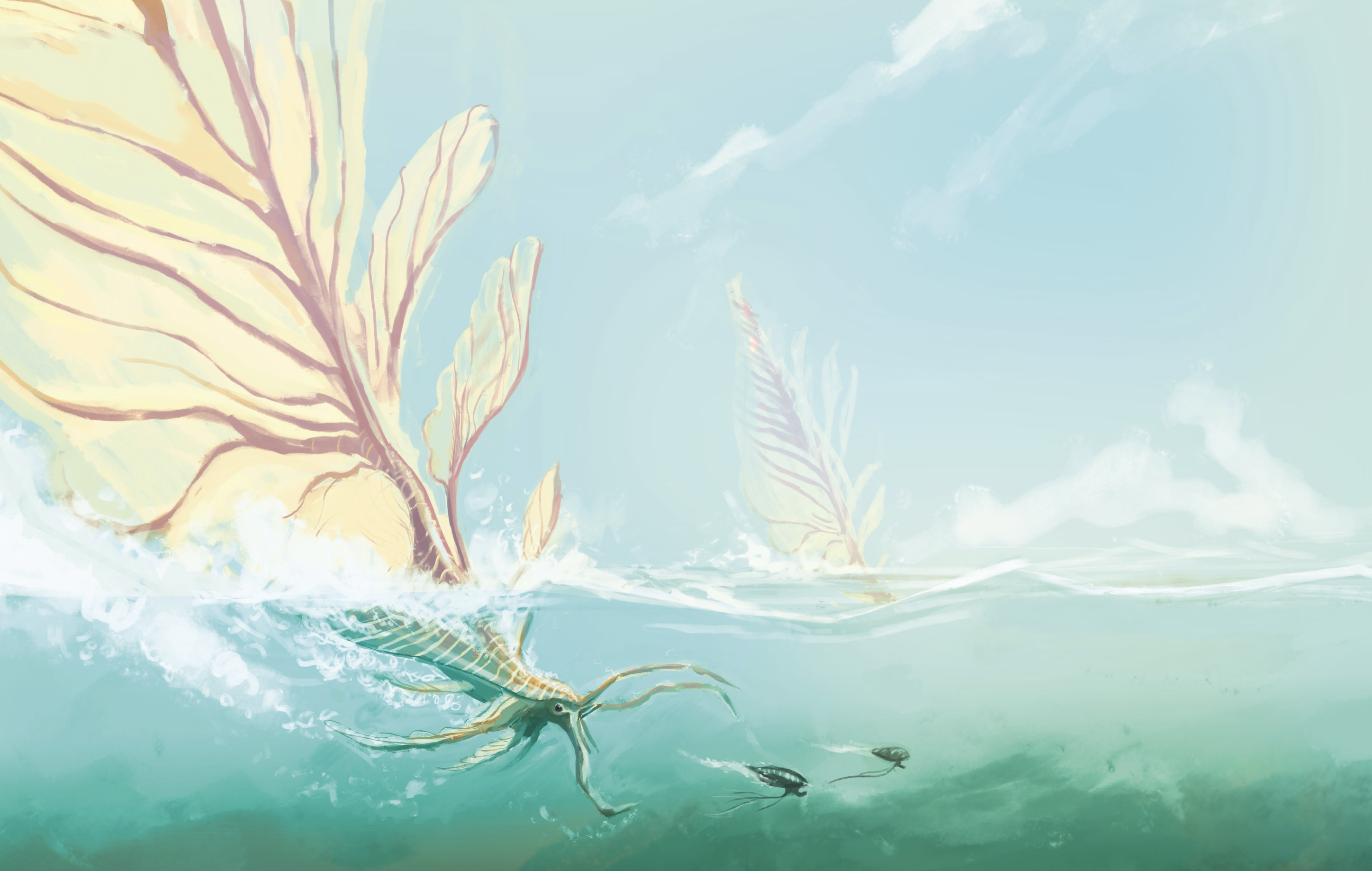I rewrote this essay - this is the old version. Click here for the new and improved one.
There’s a recent-ish game called In Other Waters and it played a crucial role in changing how I look at the world.
I really just want to talk about this.
What even is this game?
In Other Waters is a 2020 narrative, adventure game. You play as an AI helping xenobiologist - xenobiology is the study of life on other worlds - Dr Ellery Vas explore Gliese 667Cc; a planet orbiting a trinary star system that really exists.
There’s not much gameplay; instead, curiosity drives the player forwards. Throughout the game you build up a taxonomy of species by observing and examining them and there are all these theories and descriptions which still seem to barely touch the surface of the life here and then there’s the sketches…
You’re exploring an alien planet with life on it. It’s pretty much all underwater. The art is minimal, but that is more than made up for in Dr Vas’s descriptions and your imagination.
 A FEEDING DRIFTWING FLOATS PLACIDLY BY DR. ELLERY VAS // 2218
A FEEDING DRIFTWING FLOATS PLACIDLY BY DR. ELLERY VAS // 2218
The story
In In Other Waters, you assist Dr Vas in exploring Gliese 667Cc (Planet Minae) in an attempt to figure out what happened on the planet and to her partner Minae, and also document the life she finds there.
Humanity is space-faring, and companies such as Baikal are leading exploration efforts in search of resources. However, you discover that Baikal completely disregarded rules about interfering with life and, on the first other planet with life ever discovered, sought to exploit the Artificers (the most advanced form of life on the planet) for their gene editing abilities. It’s unclear exactly what Baikal was trying to cultivate, but they did so in giant vats across 3 permanent stations on the planet. Nearly all of their projects eventually failed often leaving scars on the world.
For example, the giant vats of chemical soup eventually broke and released clouds of bacteria and toxicants into the ocean. This should have destroyed the ecosystem on the planet, but instead the Artificers (almost) completely sacrificed themselves to help life adapt and contain the spread. The vats created the Bloom, the most hostile location you engage with in the game, and the most human-caused one. Oh, and Baikal left all the people there to die to make sure no one found out about what they had been doing.
Later, Minae finds the planet using a stolen Baikal vessel and tries to figure out what happened. She sets up a series of waypoints during her exploration and almost reached The Oceanic Mind but in doing descended 1.5 km underwater without a suit on and just about survived (because of the Artificers).
The Artificers are more than just an advanced species, their shells are biological circuit boards which simulate possible futures. They use this in combination with the ability to fiddle with DNA to create the symbiotic ecosystem that defines planet Minae. What you get is life with very few antagonistic relationships between species. It’s unclear to what extent this evolved naturally and to what extent this was the Artificers. Their computing power and gene fiddling abilities are what made them so appealing to Baikal.
Reflections on the story
The story quite obviously reflects on our current relationship with the Earth. Baikal’s actions and the destruction of life on Gliese 667Cc are unbearable. That said, treating life on Earth as we do now, can we really condemn Baikal for behaving as they did? They, like us (or at the very least like our systems), perceive planets and life as a mechanism, and you’re losing if you’re not exploiting it most efficiently.
Ok so, you absolutely can punish Baikal - you shouldn’t have to be perfect to criticise wrongdoing. The question is still begged: What is the difference between the beauty of life on planet Minae vs. on Earth? Or, what is the difference between wanting to punish ecocide on planet Minae vs. on Earth? Or, why do I want to protect life on this fictional place more than I want to on our own planet, where all that life really exists?
The only difference is that it’s easier for me not to recognise this on Earth, as it sustains our way of life. In Other Waters provides a fresh setting where I was able reflect and then expand my conclusions to life on Earth.
 BLOOMFANS AMONGST THE CLOUDS OF THE BLOOM DR. ELLERY VAS // 2216
BLOOMFANS AMONGST THE CLOUDS OF THE BLOOM DR. ELLERY VAS // 2216
Amos Roddy is brilliant
There is one element of In Other Waters that brings together all of the ideas and emotions expressed by the game perfectly: the soundtrack.
The keyword defining the ecosystems we see on planet Minae is symbiosis. Life which prospers by continuing to cooperate with other life. Now it is easy to call this the work of the Artificers, but it is really not so far from life on Earth. (Let’s come back to this.)
The music in In Other Waters is much like the game’s interface: minimal. We cannot see Brinestriders’ beacons or Spore Catchers flit between Stalks, because a suit has no eyes, but we can see a big dot move slowly, and a small dot fly around the reef. Similarly, we cannot hear the singstalks, because a suit has no ears, but we can hear some expressions of data our suit does collect. What Amos Roddy choses to create with this limited scope is wonderful.
What does communication even look like on another planet? For life entirely underwater, what senses do they prioritise? What frequency ranges do they pay attention to? Although we don’t know how the reef experiences itself, we catch a glimpse of the communication and reciprocity through the soundtrack.
I don’t know what Amos Roddy was thinking when making this OST, but he has managed to capture the idea of symbiosis perfectly. Nailing this is super important in a game which is so reluctant to give visual detail to the player. Most tracks (tracks for locations which haven’t been tampered with by humans) use some piano and clean synth. From the ways sounds ebb and flow together, or how call and response is used you get an idea for how the space you’re in moves around you. It’s very rare for a sound to be alone; this is natural if we continue to consider the sounds as some mixture between life communicating and the presence of the life itself.
What characterises a place? Does it move with the waves above, or is a deep silence punctuated by signs of life? The soundtrack for In Other Waters plays a big part in immersing you in the world and capturing the vibe of the place.
Symbiosis, the final track in the album, probably best demonstrates the way in which one voice is never alone when it is connected to planet Minae (or like - spoilers - when Minae is connected to the planet). Although I may be biased as this is my favourite piece in the soundtrack.
Perhaps where the OST shines the most is in showing the effects of human interference. Life on planet Minae is mostly in harmony, moving to its own rhythm. The music feels like an emergent property of this vast cooperation. Humans, however, are an artificial rhythm forced on the indigenous life. Baikal tech degrades the quality of the synth in pursuit of controlling it.
Life still insists on cooperating as even in these moments there is still call and response. The calls though, are not natural. This stark contrast in the soundtrack wonderfully reflects the presence of people on planet Minae and helped me engage with the life there in a more genuine way.
It’s pretty chill
The gameplay in In Other Waters is… not really the point, and that is not a criticism. It is a game, and it is important to the feeling of exploration that it is one, but almost all of the gameplay is simply navigating around the world. There aren’t really explicit rewards for this either, but for the right player the descriptions of the world and little details are reward enough. This mimics the reality of the situation: no one is giving Dr Vas a pat on the back when she discovers a new species, but hey, you discovered a new species. Much like how in The Witness the lack of rewards turns the relative volume up on details in the world, the lack of explicit rewards or complex gameplay increases our ability to focus on this planet and so heightens the feeling of exploration.
Awe for the world
All of this design builds to give an appreciation for the life on planet Minae; not just appreciation though, but also mixture of respect and a feeling of scale beyond comprehension. This combination of feelings is kind of like awe. Seeing that scale causes us also to reflect on how humanity nearly destroyed this planet. Of course, Baikal’s goal wasn’t to destroy planet Minae, it was to exploit it.
In order to frame this as a bad idea, we need to make some statement which either gives intrinsic value to life: “life is inherently valuable so there is value in not disrupting it so we should not always seek to exploit life maximally, but instead find some balance.” or reframes what it actually means to take resources from a planet: “a planet is not a mechanism solely, it contains living things which produce the resources we take from them. As they are produced and given freely people do not take them, but receive them as gifts. As we receive gifts, we intuitively understand that we should not take more than we need and that we should be grateful to life for the value they created. All of this is as you would behave if a family member offered you a gift.”
Often, when discussing the first argument with peers, I’ve been asked why the life has inherent value. They are saying that something shouldn’t just automatically be valuable, it only has value if it does something for us. You can follow this argument through if you want to: ecosystems maintain equilibria which provide essentials for human life. By creating monocultures or reducing habitats, equilibria can be disrupted eventually undergoing hysteresis after which point they are very difficult to restore. The largest scale example of this is in fact life on Earth maintaining the temperature of the planet. The Earth is not in the ‘goldilocks’ zone of our sun; life can only exist here because of atmospheric conditions maintained only by the life here.
We call it competition when species struggle for resources and we call it taking when an animals eats the fruit of a plant. In Other Waters reframes this very explicitly by making the extent of mutual reliance clear. Even on Earth though, life has evolved alongside itself and can only exist as part of an ecosystem.
Framing what nature gives as just that - a gift - totally changes the way we relate to it. All of a sudden we understand intuitively not to take too much, to leave some for others, and to be grateful for what we receive. Since strawberries are a gift from strawberry plants, they are also a gift when we pass them on with some value added. It reframes our whole economy to believe that something’s value is not the value of the thing but the care we put into making something and the act of giving it.
Reflecting, as In Other Waters assisted me in doing, helped me bring what I believe more in line with my actions. It is, to me, a marvel of the human mind that we can hold such contradictory stances without being disturbed by the conflicts simply because they help maintain business as usual. That said, since people are mostly good, becoming aware of those contradictions should help make the world a better place, even if it is not easy or fast.
 A GREAT SAILSHELL DIVES FOR THE KILL DR. ELLERY VAS // 2221
A GREAT SAILSHELL DIVES FOR THE KILL DR. ELLERY VAS // 2221
Since you’ve made it all the way to the end of this article, I strongly recommend you check out In Other Waters or Robin Wall Kimmerer’s Braiding Sweetgrass.
Banner photo from In Other Waters and others from In Other Waters epilogue A study of Gliese 667Cc.
Thanks for reading! I know this is a little different to what I usually write both in terms of tone and content. I was originally going to make this a video but it ended up as an article.
I’m not quite sure right now, but the next article might also not be super science/policy focused. I do plan on doing a bit more of my usual stuff soon. There’s one project I’m working on which I’m especially excited to share with you.
With pure chaotic energy as I haven’t got a new sign off yet,
Oscar Mitcham
